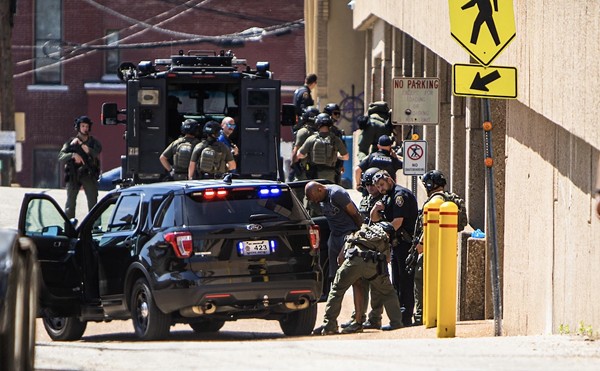The line runs a dozen deep along the wall, students thirsting for their share of the Bud Light to wash down slices of gigantic "Pointersaurus" cheese pizzas. Most of the attendees, who must wear blue wristbands to indicate they're of legal drinking age, are chilling with friends and slowly sipping their beers. But some are powering through their cups of swill and grabbing a space back in line. The Bud Light will flow for an hour or until the three kegs run dry -- whichever comes first.
"There's no limit to how much they can drink," imparts the kegmaster, who identifies himself only as an employee of Bob's Package Liquor & Tobacco, the Gravois Road store that has provided the libations.
Widespread boozing on campus is nothing new, of course, despite the fact that nearly two-thirds of Wash. U.'s 5,800 undergrads are under 21. But it's long-running events like these Thursday-afternoon happy hours -- hosted by the undergraduate-run Campus Programming Council, which receives funding from students' activity fees -- that have cemented the school's image as a "wet" campus.
University administrators insist the school strictly adheres to Missouri's drinking laws, and they defer to the school's official drug-and-alcohol policy, a four-page document available on the Web. "Missouri's Liquor Control Law makes it illegal for a person under the age of twenty-one years to purchase, attempt to purchase or possess any intoxicating liquor," the policy reads in part.
"The alcohol policy has not changed one [bit] since I started here in '97," maintains Jill Carnaghi, assistant vice chancellor of students.
That may be true, but interviews with current and former students indicate that the enforcement of the policy is changing, much to the chagrin of beer-loving, underage students. In short: Wash. U. may be drying up.
At the Campus Programming Council's happy-hour event, for example, three security workers clad in baby-blue "B&D" shirts make certain to card everyone who walks through the door.
This was not always the case.
"I remember we had to hire someone from B&D, but he, like, hung out in the back, and students would check the IDs," recalls Ross Brooks, a 1999 graduate who ran the happy hour for a year during his Wash. U. tenure. "As long as you had any form of ID, you were pretty much fine. It's like the Mexican drinking age, you know: Rules and enforcement are two different things."
Perhaps not surprisingly, many students are not happy about the changes, which run from stricter carding policies to restricting outlets where beer can be bought and consumed on campus. Students fear that such changes are a precursor to the entire campus going dry. Particularly draconian, they say, was the administration's decision last fall to impose a three-month moratorium on booze at fraternity and sorority events.
The moratorium -- which the Greek Life Office signed off on -- was enacted after two security guards were injured on frat row during an October fight. The melee broke out following a party attended by hundreds of students, some of them underage drinkers.
Such crackdowns have been common on college campuses nationwide in recent years; the National Institute on Alcohol Abuse and Alcoholism estimates that 1,400 college students die of alcohol-related causes every year. But many Wash. U. students were unhappy with the school's actions, and the Student Union Senate quickly passed a resolution condemning the ban.
"[T]he Student Union Senate of Washington University demands that the Greek Life Office consult the appropriate bodies of student government, including the Greek Community and this body, when making significant policy changes," the resolution reads in part.
"A lot of students saw it as an infringement on -- I don't know if 'rights' is the right word -- but on what they could do," says Sarah Kliff, a twenty-year-old political-science major. "I think they felt a little attacked by the administration. I think a lot of students viewed it as an overreaction."
Kliff points to changes like the elimination of kegs from the twice-annual campus bacchanal WILD (Walk In, Lay Down Theatre) last year. Others note the elimination of booze from the campus bar, which was transformed into a Subway sandwich shop in the summer of 2003. Students say the new policies have done very little to stop underage drinking.
"Drinking's gonna happen no matter what happens on the campus. Everyone knows that," muses Daniel Haykin, a senior psychology major. "It just really hasn't changed anything to have the drinking policy not allow it. People are just drinking more in their rooms. It's just making things more secretive."
Haykin, a member of the Sigma Alpha Mu fraternity, says that people continue to get ill at "dry" parties.
"If they aren't serving alcohol at fraternities, but people are still getting sick, then they're obviously still drinking," Haykin concludes. He worries that if the school continues to crack down, underage kids who get sick will be less likely to call for help, lest they face punishment from the school (or their parents).
Dean of Student Affairs Justin Carroll helps train resident advisors, upperclassmen who live in the dorms and are often responsible for dealing with freshman boozers. Carroll says he agrees with Haykin's concerns in principle.
"The resident advisors don't act as policemen. On the other hand, they do care for the well-being of their residents," he says. "We focus our time and attention on how the misuse of alcohol affects the community and the individual."
Though Carroll says that his office's policies have remained essentially the same over the past few years, he does acknowledge that there have been tweaks.
"You won't see the 'trophies' now, the beer cans lined up in a residence hall window. That, we feel, is flagrant. It kind of sends a message to the members of the community. The misconception has been that the university doesn't have a policy, that we have no expectations. That was the old kind of thinking, and when you saw things like that, that would send that message to other students and new members of the community."
But Carroll acknowledges that not everyone's pleased with the changes.
"It's funny: I was just with alumni who graduated twenty years ago, and they think that the policy has gotten much more restrictive." He chuckles, then grows reflective. "It probably has, but you have to see it as relative to what else is going on."
With all of this in mind, the Campus Programming Council may need to give its happy hours a fairly drastic facelift. A recent e-mail from the CPC secretary to other members of the group voices this concern: "SU [Student Union] says we need to get the under 21 group. Any ideas?"






